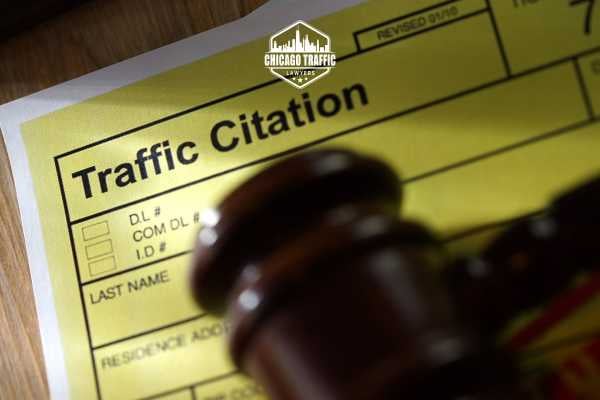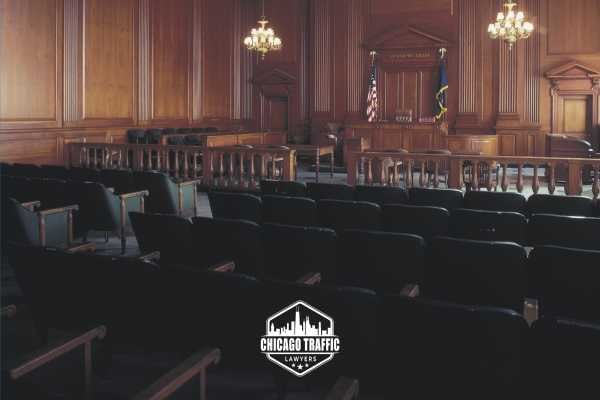A court arraignment is the first step in a criminal case. The defendant appears before the judge and pleads guilty or not guilty. During a traffic ticket arraignment, the judge reads the charges, asks if the defendant understands, asks for their proof of compliance and plea, and sets a traffic ticket trial date if needed. The defendant may also have to pay a fine or set up a payment plan.
For more information about traffic violations or an arraignment, please contact our Chicago traffic defense lawyers. Call us at (708) 465-1040 to schedule a free consultation.
Table of Contents
What is an Arraignment?
An arraignment is a court hearing where the defendant learns the charges and enters a plea. In a traffic ticket arraignment, the defendant is told about the charge and any fees or fines. The defendant then pleads guilty or not guilty. The court may also set a trial date if needed, depending on the violation and other factors.
What is a Traffic Ticket Arraignment?
A traffic ticket arraignment is a court hearing where you can plead guilty or not guilty for the violation. The judge will then set a trial by judge date, accept fines, or order other punishments.
Types of Traffic Tickets
A court arraignment for a traffic ticket is a process in which the person who has been issued a ticket is formally charged by a judge or magistrate.
During the arraignment, the individual will be informed of the charges against them and asked to enter a plea of guilty, not guilty, or nolo contendere (no contest). Depending on the jurisdiction, the court may also schedule additional proceedings such as a pretrial hearing or set a date for trial.

Depending on the type of violation, different types of traffic tickets may be issued. These include speeding tickets, running red lights, equipment violations, failure to yield to a police officer or obey stop signs, and reckless driving. Depending on the severity of the violation, plea bargaining may be an option for both prosecutors and the defense.
Minor Infractions
During a court arraignment, a person with a traffic ticket appears before a judge and pleads guilty or not guilty. This is necessary for minor infractions like speeding or running a red light.
At the arraignment, the judge informs the defendant of the charge and any fines or fees. The defendant then enters a plea of guilty or not guilty. If they plead not guilty, the court may set a trial date or allow the defendant to reach an agreement with the prosecutor.
Minor Violations
A court arraignment is a formal hearing for a minor traffic violation. The defendant appears before a judge and pleads guilty or not guilty. It’s a chance for the accused to enter their plea and learn about the charge. The judge asks questions about identity, prior offenses, and the plea. The judge may also set a trial date or allow agreement with the prosecutor.
Misdemeanors
A court arraignment for a traffic ticket is a formal reading of the charges in criminal court. The accused appears before a judge who informs them of the charges and their rights. Bail or future hearings may also be decided at this time. For traffic tickets, this is often the first court appearance. The defendant will enter a plea of guilty or not guilty and may set a traffic court trial date if needed.
The Arraignment Process
An arraignment is a person’s first court appearance after receiving a traffic ticket. During this hearing, the accused will learn about the charges and can plead guilty, not guilty, or no contest. The judge may also set bail.

At the arraignment, the defendant can make their plea, and depending on the plea, the judge may set a trial date or accept payment for fines. The accused may also be required to attend more hearings or participate in alternative punishments, like community service, traffic school, or education classes.
Courtesy Notice
A courtesy notice is sent after a person receives a traffic ticket. It informs them of their court arraignment, including the date, time, and location. The notice also provides instructions on pleading guilty or not guilty. The recipient can accept the plea agreement or attend the arraignment. During the arraignment, the accused can enter a plea or request a trial date.
Guilty Plea
A guilty plea for a traffic ticket is when someone admits responsibility for the violation and accepts the charges. This can be done in court with a plea hearing or by sending a plea form. The defendant states their guilt in front of a judge, who records the plea and may impose penalties.
Separate Arraignment
A court arraignment is a legal procedure that takes place when someone is accused of a traffic violation. During an arraignment, the court will read the charges against the defendant and ask how they plead. If the accused enters a plea of guilty, then there may be no further proceedings and they could face fines or other punishments as determined by the court. If the accused pleads not guilty, then a separate trial will be scheduled.
Traffic Trial
A traffic trial is a court proceeding to contest a traffic ticket. It starts with an arraignment, where the defendant enters their plea. If guilty, the judge convicts and sentences. If not guilty, a trial is scheduled.
Learn More: What Happens if You Miss Your Traffic Court Date?
At the trial, evidence is presented, and guilt or innocence is determined. Guilty may result in fines, points, jail time, and other penalties. Not guilty leads to dismissal of charges.
Attorneys in Traffic Court
Attorneys play an important role in the criminal justice system. They provide legal advice to defendants who have been charged with a traffic offense and represent them at their arraignment and trial.
During an arraignment, the attorney will review the details of the case with the defendant, discuss potential defenses or plea agreements, and advise them on how to proceed. At trial, the attorney may present evidence, cross-examine witnesses, and make closing arguments on behalf of the client.
Cost of Traffic Citations
A court arraignment for a traffic ticket is when the accused person goes to court to address the charges on their ticket. The judge will tell them the charge and ask for their plea of guilty, not guilty, or no contest. Depending on the traffic department violation, they may face fines, points on their license, and other penalties. The costs can differ depending on the violation and where it happened.
Traffic Appeal
The traffic appeals process involves challenging a traffic ticket or related violation. You can pay the fine or challenge the citation in court. If you choose to challenge it, you must attend an arraignment hearing.

At the arraignment, you plead guilty or not guilty. If you plead not guilty, a trial will be scheduled. At trial, you can appeal aspects of your ticket or raise defenses to challenge the citation.
Payment Options for a Traffic Ticket Arraignment
If you get a ticket, you might have to go to traffic court for an arraignment. The arraignment is the first hearing for a criminal case. At the arraignment, the court tells you what charges you’re facing and lets you enter a plea.
The payment options for a traffic ticket arraignment depend on your plea.
- You can plead “guilty” or “no contest,” which means you’ll be convicted and have to pay the fine.
- Or you can plead “not guilty,” which leads to a trial. If you’re found guilty at trial, you’ll have to pay the fines.
- You might also be able to set up a payment plan with the court.
Speak to an Experienced Chicago Traffic Lawyer Today!
When you receive a traffic ticket, it is important to understand what the process is and how to ensure that your rights are protected. An arraignment is the first step in the process of resolving a traffic ticket in Chicago. At an arraignment, you will be asked to enter a plea for the charge or charges against you.
At an arraignment hearing, the judge will ask you whether you are pleading guilty or not guilty. If you plead guilty, the judge will enter a conviction and impose fines, points on your license, and other penalties. If you plead not guilty, a trial will be scheduled. An experienced traffic attorney can help ensure that your rights are protected at each stage of the process.
If you have been charged with a traffic violation in Chicago, contact an experienced Chicago traffic lawyer at Chicago Traffic Lawyers today to discuss your case and learn more about your rights.
Our firm is experienced in representing clients accused of traffic offenses in the courts of Illinois.


